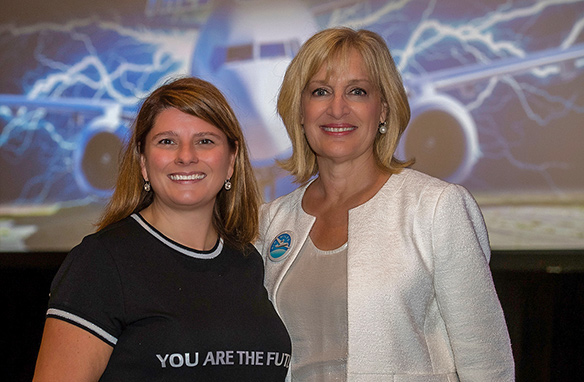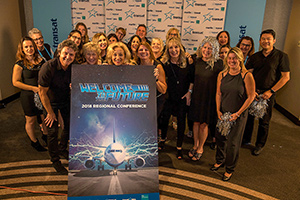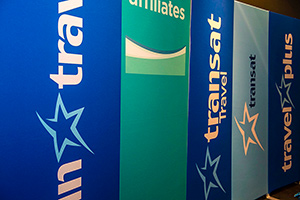
It’s not as scary as you may think
Welcome to the future
BOB MOWAT
(Photo above courtesy/ TRANSAT DISTRIBUTION CANADA)
(In the first part of a two-part feature, Canadian Travel Press’ executive editor, Bob Mowat sits with Transat Distribution Canada’s general manager, Nathalie Boyer and its vice-president marketing and industry relations Susan Bowman and discovers that the future of retail travel is looking good, real good.)
If the truth be told, the future may not be as scary as you may think.
Consider, for example, a story that Transat Distribution Canada’s (TDC) general manager Nathalie Boyer tells about taking her 13-year-old son Samuel to her office recently and asking him to put together a report for her on robots and new technologies that she could use for a presentation.
In response to her request, Boyer told Canadian Travel Press: “He said perfect and pushed me out of the office; used my office, my board, my computer and at the end of the day, he said: ‘Mom, I need to come back tomorrow, I haven’t finished, but it’s going to cost you money.’”
The upshot is that Samuel returned the next day, produced a 10-page PowerPoint report in which he concluded that: “Robots and new technologies will never replace a good travel professional. And why? Because they don’t have the emotional intelligence and experience to make the client’s experience unique.”
Said Boyer: “I think it was worth the $20 it cost me,” because Samuel’s report made it crystal clear that travel professionals don’t need to be afraid of innovation.
“We need to use technology to our own benefit to make some value-added items for the client because nothing will replace the experience or the knowledge or the way a human being can interact with another one [human being] and make sure the client sees the overall added value of what we are providing them with,” she told CTP.
Be open to change
In fact, TDC’s 2018 cross-Canada, Welcome to the Future conferences were all about innovation – what it means and how it will impact on an agency’s business.
Yet it isn’t simply about new technologies. What Boyer is talking about is “how we feel about change” and the fact that while many agents find it easier to continue working on a blue screen, there are innovations out there “that can make them more efficient” if they’re open to trying them.
She told CTP: “We are talking about the customer of yesterday, today and tomorrow and at the same time, we are talking about the skills that were required by an agent in the past, today and in the future.
That’s a discussion Boyer said that includes looking a new and emerging technologies that are coming into the market today – automation, virtual reality, blockchain, social media, mobile, robots, chatbots, cryptocurrency – and familiarizing TDC agents with those technologies and how they will impact them in the near future.
“The future is really good for the travel professional that really wants to bring value to the customer. We are working in the right direction. We need to be efficient in the way that we are working, but we need to open our horizons to something else. The packages
are there. The flights are there, but people want more and more adventurous trips.
They want luxury [product]. They want that unique experience.”
She explained that: “We need to make sure that the 50% of things that we are selling – which is packages – is quite efficient so it’s giving the opportunity to the travel professional to work on other added value stuff [because] the customer who wants a package [now] may also want something else later on during the year.”
Tools to succeed
To that, Boyer said that TDC is focusing on its agents to make sure that they have the necessary training and tools to succeed.
She pointed to training sessions on Spain and Portugal product; on how to increase sales using social media; and “we have a session on how to communicate with impact just to help them try to influence the client and understand how to interact more and more with the client the way the client wants [to interact].”
Susan Bowman, vice-president marketing & industry relations, TDC, told CTP that the group is also training its agents on Air Miles, explaining: “We have quite a big session on Air Miles, just on our expanded relationship. It’s important that we continue to help them [TDC agents] to give the best experience to Air Miles collectors now that we are exclusive with packages and cruises.”
Buzz, buzz, buzz
So what’s the buzz these days? What are the hot trends?
Well, one of them, observed Bowman “is that we have been doing a lot in-destination weddings, not only down South, but also Europe. It’s a big market for us; it continues to be a big market. And one of the trends that we have noticed is there is demand for the LGBTQ market.
She explained: “What we asked ourselves is what does that community need that is maybe different than from a different one. If you’re doing a wedding for people that are from India, there are certain things that they need and want in that. If you’re doing one for somebody from Toronto, it may be different again.”
“So we reached out to some specialists,” Bowman said, “and got a lot of advice about the way that they wished to be referred to. So what language do you use; what kind of marketing do they need; what kind of collateral [do they need] for their guests. And then we reached out to our product suppliers [to see which ones] were receptive; those that had great situations for that particular target group.”
Said Bowman: “This is a need that is going on that nobody seems to have has addressed. And that’s interesting because you would think it would be a natural thing. I mean people have been legal to get married in Canada for a long time and it’s interesting that nobody has focused in on this.”
Bleisure is exploding
As for Boyer, she told CTP that TDC is seeing a “pick up in adventure travel; bleisure travel is exploding; and luxury, niche and groups [are growing] – [and] all of these are new trends.”
Yet the big one for TDC’s general manager is bleisure travel.
“I think there is a lot to gain from that. This is a good trend where a good travel professional can bring a lot of value to [the client]. So I’m pushing the network to go a bit toward that direction.”
However, Boyer makes it clear that: “We are not a TMC and I don’t want to qualify us as a TMC, but I’m sure there is a group of smaller corporations that needs to get assistance from a good travel professional that can bring not only the business travel to it, but also the leisure travel side of the equation to a [business/corporate] traveller.”
As for luxury travel, Boyer is quick to note that there are “different definitions of luxury,” explaining: “For me, when we are talking about luxury, there is that ultra-luxury that is another world – private jets, cruise, villas – and this is all new. We are seeing more and more packages this year where people are spending a lot of money to do a 20-day cruise and it is costing them a fortune to do that, but luxury doesn’t mean the same for everyone.”
Bowman agrees, telling CTP: “It’s more like a la carte luxury. You know, maybe everybody is talking about it because as the Boomer generation is getting more and more into retirement it could be also that they’ve done a lot of the mainstream things and I think that’s also part of this luxury adventure that we’re seeing.”
Demand for a la carte
She continued: “A lot of people in that group [Boomers] are not happy just to sit. They want to do and they want to experience and they want to put their footprint where they’ve never put it before.”
The result, Bowman said is: “They’re not going to put up with doing it and being in line-ups or being in sub-standard accommodation or eating regular food – they want to do it right. Luxury is getting wrapped up in that. And that target group [Boomers], in particular, feel that they are deserving of these kinds of experience now.”
She also points out that “a lot of them have set their sights on 8 to 10 years of solid travel and what they don’t want is, you know, don’t give me the regular stuff and tell me to go sit in a little hotel in Europe. I want to know when I get to Europe, I’m going to A, B, C & D. So I think that for me, and I agree with Nathalie [Boyer], that it’s the combination of ‘I’m ready. I deserve it. I want what I want’ and we need to be able to respond to that.”
And Bowman adds: “So when I hear everybody wants to get into luxury, what I’m hearing more is ‘you really want to get into the a la carte market’ and understand a wide and broad depth of product as well as experiences that people can have.”
As Boyer sees it, it is all about the experience or the experiences. “People like to feel that they are unique and that their experiences are unique and that the neighbour won’t do the same thing.”
Bowman agrees, observing: “It used to be, even on a social level, people would say to me ‘where have you been?’ And you’d go through all-inclusives and Caribbean cruises, but now what they want to hear is okay, so if you want to go to Italy have you thought of a luxury retreat? ‘Well I can’t afford that. But if you have six couples, and you do the math, so it’s $300 a night and by the way, this is what you can [stay in]. Oh, and you can have a chef. And they want that.”
Is the week weakening?
So with all the buzz about luxury travel – or a la carte travel as Bowman defines it – it seemed obvious to ask whether the seven-day holiday is now out of fashion?
“Absolutely not,” was Bowman’s unhesitating response. “What’s really interesting to me is that this is all in addition to [a seven-day vacation].
She continued: “The winters are the winters that Canada has and [people] want [their] 7 days in the sun because [they] won’t make it through the winter if [they] don’t get it. So what’s interesting is that these trips [the luxury trips] are the second trips of the year, within the same 12 months and we’re seeing an awful lot of people doing that.”
In fact, Bowman said that TDC is “doing very well in all of our mainstream product lines and all of this [luxury travel] is additional. So our growth, with people like Collette or G Adventures, is huge in these categories. And you can see it coming in and often even our own travel consultants are reporting that their often the same customers booking these winter and spring-summer-fall and then the big ones [trips] coming in. It’s great.”
However, Bowman did, have some concern about overtourism, telling CTP: “I think, sadly, what’s coming next is overtourism. It’s going to kind of reverse where people today say I’m going to and then what am I going to do there and I think what’s going to happen is, you’re going to decide what you want to do and then you’re going to get an entry or ticket or a reservation for that and then you’re going to build your travel around that.”
She observed: “We’re not far from that in a number of major places. It’s not a bad thing, but I think it will change the way and the timing of how we look at travel.”
A community of experts
While that may apply to the mass tourism sites, the trend for many travellers these days is to get off the beaten track.
“People want to live like a local,” Boyer said. “This is another trend and you will see it more and more with the younger generation because for them, an office can be anywhere in the world. They can be sitting in Montreal or Toronto or even Shanghai because it doesn’t matter because they can find a small spot to work and they want to travel the world the same way. So this is a new trend that we’re seeing and we’ll see it more and more with the younger generation.”
However, for travel professionals all of these new trends are a challenge to keep up with, leading Boyer to observe: “Travel professionals need to know everything and this is where it is critical to give them access to tools and we decided last year that we were building a platform, not only for our employees, but our franchisees as well, where they can all post their fam tour reports and work as a community.”
She explains how it works: “So if someone is coming and asking you about a destination in Peru where you’ve never been, you don’t want to lose that potential sale, so you go on our system and you pull out all of the fam reports for that destination. You have the contact information from another travel professional who’s an expert in that destination and you can connect with that agent. And then you can share information and really work as a community to make sure we have the benefit of the overall expertise of everyone.”
As well, said Bowman: “We’ve built functionality online on our web sites to profile all of our consultants with so once they’ve gone on the fam trip, they can update it there. And we’re finding a lot of people are ‘Googling’ saying they’re looking for an expert in this or that and then the travel agents are bubbling up – so language, destinations, experience, all that kind of stuff.”
The thing to remember, said Boyer is that: “Every client is unique. [Some] want to come to you [with] their itinerary already built and they want to participate in building their journey. Others will just say give me what you recommend for this or that. Everyone is quite different and you need to find the right agent for the right client and this is where the match is important.”
A model for everyone
So how do you sum it all up?
Well, said Boyer, it’s pretty simple: “We firmly believe in the future of the travel professional and we will do everything we can to make sure our members have all the tools, the education and the support they need to grow and to survive in the new reality that is coming.”
And Bowman will also remind you that TDC is “one of the few retailers left in Canada that is owned and operated by Canadian management.”
To which, Boyer will add: “We are also probably the only [retailer] in the country that runs a franchisee/franchisor relationship, affiliate, Agent at Home and it’s own retail as well.”
With Bowman summing up nicely: “So we have a model that works for any particular agent.”
(NEXT WEEK: Boyer and Bowman talk about some of the challenges that retail travel faces going forward.)



